Part 2. German Fidelity: For if the trumpet gives an uncertain sound, who shall prepare himself to the battle?
During the terrible years 1939-45 many ecclesiastics and masons were united in their ideals, sometimes in their martyrdom.
To return simply to a hostile status quo seemed to them impossible, immoral.
It is really from that period that we can date this sincere effort on both sides to draw up the balance sheet of the causes of misunderstanding, and, without rushing things, at least to study in common a common difficulty.
(Alec Mellor, Our Separated Brethren, the Freemasons.)
This four-part series considers;
(i) the separation of British Freemasonries from the Grand Orient of France (GOdF); and
(ii) maintaining fraternity with the Prussian Grand Lodge of the Three Globes. Both decisions impact on the relationship of Freemasonries with religion, both in their different ways can be understood as battles for the soul (“essence”, Carnarvon) of Freemasonry.
However, Freemasonries and religions, are ‘by schisms rent asunder’ – a failure to agree on fundamental principles.
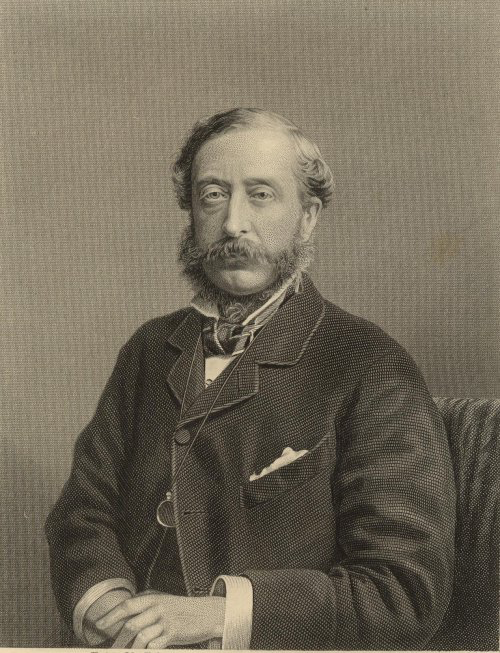
Henry Herbert, the Rt Hon. 4th Earl of Carnarvon (1831-1890)
IMAGE LINKED: wikimedia Attribution 4.0 International (CC BY 4.0)
Perhaps the defining characteristic of our species is that we learn and believe through the medium of stories, narratives, fictions and fabrications.
Belief in the same story creates trust among the believers; this has provided the basis for widescale human cooperation.
How might the battle for the souls of Freemasonries be identified in a way that ensures thriving in the 21st Century?
There is no guarantee of the immortality of the soul of Freemasonry! ‘We study the past in order to free ourselves from it.’ (Hariri)
Part 1. French Infidelity: A New Covenant. Following a consideration of the Grand Orient de France’s (GOdF) decision to remove the requirement for initiates to;
(i) believe in God; or (ii) believe in the immortality of the soul; Pro Grand Master Carnarvon considered this opposed to the principles upon which civilisation and Freemasonry were based.
A Committee was formed ‘to enquire into the facts of the case and to report back with recommendations’.
If that wasn’t enough for one night, it was followed by, ‘The German Question’.
Part 3. French Perdition: ‘…for what fellowship hath righteousness with unrighteousness’? (What fellowship hath righteousness with self-righteousness?)
Part 4. The 1877-8 arrival of Post Truth: ‘…. new heavens and a new earth…the former shall not be remembered’.
Part 2. German Fidelity: For if the trumpet gives an uncertain sound, who shall prepare himself to the battle?
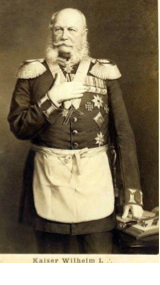
With Prussian military victories over Denmark, Austria and France, 1864-72, King Wilhelm I of Prussia became Kaiser (Emperor) and Grand Master over many German-speaking civil and Masonic jurisdictions.
Just as the French issue pertained to one jurisdiction in France, ‘The German Question’ pertained not to a Grand Lodge but to one of the congeries (informal collection – as say a cluster within a province) based in Berlin but known as The Grand Lodge of the Three Globes.
Congeries became conduits to ensure Masonic support for the German Empire, the Prussian state, and the Lutheran faith community.
Some of the early lodges were Christian-only; some of which as part of a general liberalisation in the 19th Century, began to admit non-Christian initiates and Masonic visitors.
In part, this process was reversed, even to the extent of refusing admission to visiting non-Christian British Freemasons.

Seal of the Grand National Mother Lodge ‘The Three Globes’ of Berlin in Germany By Akazia030 – Own work, Public Domain – wikimedia.
In 1841, this was drawn to the attention of Grand Master Zetland; about which, he was far from content but minded to avoid ‘interfering’ in another jurisdiction.
However, Zetland, followed by Ripon (1870-4) were the last Whig Grand Masters. Initially, English Freemasonry was supportive of (a) contractual monarchy; (b) aristocracy; and (c) more deist and dissenter than mainstream in religion.
Given that religion was a key divisive element within the English Civil Wars, distance from religion was a seminal value of the Royal Society, chartered in 1663.
The Royal Society’s Declaration (‘Antient Charges’) stated, ‘…not to lay the foundation of an English, Scotch, Irish, Popish, or Protestant philosophy; but a philosophy of Mankind’. (‘la solidarite humaine’? See Part 1.)
It is highly unlikely that Royal Society members would have joined British Freemasonry had its values been different from theirs; the 1723 ‘First Charge of a Freemason’, ‘Of God and Religion’ was quite compatible with the Declaration.
Following the appointment in 1874 of the Prince of Wales as Grand Master, by 1877, English Freemasonry was now supportive of; (a) contractual monarchy; (b) aristocracy; (c) the Conservative Party and, (d) the Church of England.

The Arms of the Royal Society of London for the promotion of natural knowledge..
IMAGE LINKED: Wellcome Collection – Attribution 4.0 International (CC BY 4.0)
The Constitution of the Three Globes required that only those with Christian belief could be initiated or received as visitors.
It required confirmation of their attempt, hitherto fore, to fulfil their duties as Christian citizens; and assurance, they would continue so to do.
However, just as the new Constitution of the GOdF did not enjoy total support; Christian-only Freemasonries did not enjoy support from some of the German Grand Lodges or from some English lodges.
In March 1877, Montefiore Lodge No. 1017, meeting at the Regent Masonic Hall, Café Royal, Regent Street, London, invited English lodges to sign a petition for submission to Grand Lodge.
It asked for representations to be made for alteration of the Three Globes policy.
Significantly, given the Christian religiosity swirling around English Masonry at the time, three hundred English lodges, a third of the total, signed the petition.
In his thesis, ‘The 4th Earl of Carnarvon (1831-1890) and Freemasonry in the British Empire’ (Sheffield 2010), Jim Daniel’s writes, ‘Tenterden argued that contrary to the wishes of some 300 (mainly Jewish) petitioners….’ (p. 88).
It is not clear that this was the case, the petition was sent to lodges to be discussed and voted on in open lodge: it is unlikely that there would there have been three hundred ‘Jewish’ lodges in the English jurisdiction.

Minute Book. The Lodge of Saint Mary No.1312, 27th March 1877
IMAGE CREDIT: provided by author
Indeed, one of the Petition’s signatories was the Lodge of Saint Mary No. 1312, allegedly named after the local Deanery of St. Mary The Virgin.
The minutes of the meeting, read, ‘A letter received from Montefiore Lodge with a petition against the exclusion of the Hebrews in Germany’.
It was unanimously resolved that, ‘the petition be signed by the WM’.
He was Revd H.S. Elliot, former Provincial Grand Chaplain of Warwickshire; none of the Lodge members, appeared to have had Jewish names.
The Petition read:
‘We, the undersigned, Masters, Wardens, Officers, and Members of the various Lodges most earnestly and respectfully solicit that Grand Lodge will take the same into their serious consideration, and will use such means as may be deemed by them most advisable to secure a permanent and satisfactory alteration of the Laws of the said Grand Lodges of Germany, which Laws, your Petitioners humbly submit, are, in their present rendering, contrary to the first principles of Freemasonry.’
Perhaps there are three ‘principles’ under consideration:
(a) The principle that, a jurisdiction can deem the privileges of Freemasonry to be exclusively for Christians.
(b) Given (a), such jurisdictions will, in principle, deny the regularity and therefore refuse recognition and reception of non-Christian Masons – not recognised as, ‘true and genuine Brethren’, even though, from recognised jurisdictions.
(c) That as a matter of principle, jurisdictions, open to non-Christians, will recognise and not interfere with the working of Christian-only jurisdictions.
An uncertain sound?
The motion before Grand Lodge was:
(1) That it would receive the petition.
(2) Invite the Three Globes to reconsider its policy; and,
(3) Communicate same to the Three Globes.
It was claimed in the debate on the French Issue that matters of principle justified ‘interference’ in the affairs of another jurisdiction.
In speaking to the Petition, the Revd Brother Simpson claimed that denying admission into their lodges of non-Christian Masons from recognised jurisdictions, ‘brings into question the essence of Freemasonry’.
(As Carnarvon said when considering the GOdF issue.)
Lord Tenterden:
(1) ‘When Freemasonry was introduced into Germany last century it was constituted on the Christian system of St. John. England had acknowledged this German Grand Lodge as a Christian Lodge for 137 years.
(2) There were other Lodges which a person who was not a Christian could go to in Germany and be received in. When [a non-Christian English mason] went to a Christian Lodge in Germany, he knocked at the wrong door he made a mistake in doing so.’
Israel Abrahams:
Not a Jewish question, but an English one. As an English Freemason he demanded right of entering any Lodge.
The Earl of Limerick:
It was the Grand Lodge of England who thought fit to depart from those principles 1813, up to that time the profession of Christianity was required in all candidates. [If true, which it wasn’t, might not this not be considered as ‘a startling innovation deserving of exclusion by the Christian-only jurisdiction?]
Samuel V. Abrahams:
If an alteration is desired on fundamental principles, it is advisable to go to the fountain head; and at the head of this Grand Lodge stands the name of the Emperor of Germany as the Grand Patron of the Order.
Aeneas J. McIntyre, QC, Grand Registrar:
(1) We should consider it the height of impertinence if any other Grand Lodge should approach us and tell us what our law should be. [Apparently not in the case of the GOdF!]
(2) Up to 1813 the two Grand Lodges of England were Christian Grand Lodges. In 1813, at the time of the Union, we became a Universal Grand Lodge, and Jews were admitted amongst us. [Evidence for this? There is to the contrary.)
(3) The matter is entirely different from the position we stand in as regards the GOdF. There they make an innovation. [And the alleged change at the Union from Christian to Universal was not? If this had been the case, which it wasn’t, in 1813 the Three Globes could have severed relations with the fledging UGLE over a possible ‘startling innovation’ to admit non-Christians and then inform, that it would not receive members of the newly formed UGLE.]
(4) The Emperor of Germany might just as well come and say to the Queen of England, ” Why is it that according to your laws a Jew cannot be Lord Chancellor? You repeal that law, or else, what? [The law was repealed.]
(5) It does seem to me that it is the worst precedent in the world to set, to interfere with the laws that are deliberately arrived at by a sovereign authority. [Was not the GOdF a sovereign authority?]
(6) There are certain Lodges here who only receive particular classes. The Apollo University Lodge of Oxford only receives members of the University. [For Initiation yes, but it received non-University visitors from recognised jurisdictions!]
Revd R. J. Simpson PGChaplain:
‘With regard to the point mentioned by Brother McIntyre, as to the Constitution of England before 1813, he had yet to learn what words were to be found in the Constitutions, similar to what were to be found in the German Constitutions of the Three Globes, which do exclude men of the Jewish persuasion.’ [Answer awaited.]
The Earl of Carnarvon ProGM, from The Throne:
(1) ‘Regretted the course which the Three Globes had taken.
(2) ‘We could not take up our position on the same ground that we had occupied with regard to the Grand Orient of France that body made a distinct and startling innovation.’
(3) The Grand Lodge, lastly, must bear in mind: if they agreed to this resolution and requested H.R.H. the Prince of Wales, the MW Grand Master, to convey a resolution to the German Grand Lodge and the Emperor of Germany, as the head of that Grand Lodge, this Grand Lodge placed its Grand Master in a position, from which he [Carnarvon] frankly owned did not see how the Prince of Wales could extricate himself satisfactorily, as he had been initiated into a Christian-only jurisdiction.

Robert Freke Gould – The History of Freemasonry (1885)
IMAGE LINKED: wikimedia Attribution 4.0 International (CC BY 4.0)
Present at this meeting was Robert F. Gould the foremost, living, historian of English Freemasonry.
He must have known that key statements made by the Earl of Limerick and A. J. McIntyre QC, Grand Registrar, regarding British freemasonries up to 1813 being Christian-only, were incorrect.
Why did Gould remain silent and not support the comment of Revd Simpson?
Surely the sons of the Noahide Articles and the sons of the Grand Originals are entitled to be recognised and received as Freemasons? Obviously not.
Clearly, the Revd Smith was pressurised to withdraw the second and third parts of his motion; thus, the petition was received and no more.
In Part 3, the Committee’s report on the Grand Orient of France’s revised Constitution will be considered and the resulting decision; it will be compared with that made on The German Question.
Again R.F. Gould was in attendance; his only contribution was to Second the re-appointment of The Prince of Wales as Grand Master.
Article by: Gerald Reilly

Gerald Reilly was initiated in 1995 into St Osyth's Priory Lodge 2063. Essex. England (UGLE).
He was a founder member of Josh Heller's Allthingsmasonic, and with Josh co-wrote 'The Temple that Never Sleeps' (Cornerstone Books, 2006) he is committed to the development of e-Freemasonry.
Awarded the Norman B Spencer Prize, 2016.
Book: by Gerald Reilly

The Temple That Never Sleeps
by Josh Heller and Gerald Reilly
Freemasons and E-Masonry Toward a New Paradigm
A revolutionary book for every Freemason.The two authors, American and UK Masons, present a radical view of Freemasonry for both today and tomorrow.
In addition to their ideas are those of numerous Internet Masons (E-Masons) from around the world who, by sharing the experience of their own Masonic journey, have provided stunning personal insight into the viability of the Craft in the Internet Age.
This book will challenge your understanding of Freemasonry today and how it might transform for future generations.
Recent Articles: by Gerald Reilly
 How can the allegory of the Tower of Babel teach us tolerance? Language can be a divide. Not confusion among languages but rather within language, a seriously unclear understanding of another’s world-view. We assume it is so different from our own and yet with clarity, a realisation there is more which unites than separates. |
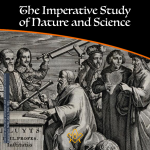 The Imperative Study of Nature and Science At some stage during Freemasonry's Second Degree, the candidate is advised that there is now permitted, something like, the extension of their research into the hidden mysteries of nature and science. Such is an excellent permission and one that each and every Freemason should pursue with awe and passion. |
 Pure Ancient Masonry; P4. A Companion in Rule, Building a better world P4. A Companion in Rule, Building a better world - The four parts of Pure Antient Masonry comprise the ‘body’ Masonic; they are the building blocks of the vital relevance, through enhanced citizenship, wherein the soul of Freemasonry abides. |
 Pure Ancient Masonry; P3. The Master, Building Better Character Part 3: The Master, Building Better Character - Being raised is a transition from knowledge to wisdom. |
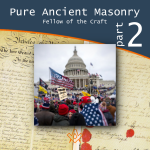 Pure Ancient Masonry; P2. A Fellow of the Craft Part 2: A Fellow of the Craft, Building Better Knowledge. Pure Antient Masonry consists of four parts. ‘Building the Temple’ is the fundamental Masonic allegory for building better people; this must be understood as a seamless whole: |
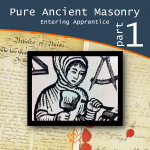 Pure Ancient Masonry; P1. An Entering Apprentice Part 1. An entering apprentice: Building Better Communities; Pure Antient Masonry consists of four parts. ‘Building the Temple’ is the fundamental Masonic allegory for building better people to build a better world |
 Pure Ancient Masonry; Intrduction This series will consider the defining characteristics, lessons and benefits of Three Degrees, the Order of the Royal Arch and when conjoined, Pure Ancient Masonry. |
 The Christianising of British Freemasonries - P4 This concluding article in the series considers the separation of British freemasonries from the Grand Orient of France (GOdF) and maintaining fraternity with the Prussian Grand Lodge of the Three Globes. |
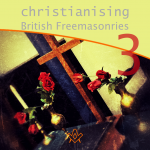 The Christianising of British Freemasonries - P3 Discover the battle for the 'soul' of Masonry. Part 3. French Perdition: ‘…for what fellowship hath righteousness with unrighteousness’? |
 The Royal Arch – ‘the fourth step in regular Freemasonry’ United Grand Lodge of England, has now designated the Royal Arch, the fourth step in regular Freemasonry, it therefore must be concluded that…publications…should now be revised, and based on attracting to the benefits of the four steps. |
 The Christianising of British Freemasonries - P2 How might the battle for the souls of Freemasonries be identified in a way that ensures thriving in the 21st Century? There is no guarantee of the immortality of the soul of Freemasonry! ‘We study the past in order to free ourselves from it.’ (Hariri) |
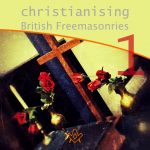 The Christianising of British Freemasonries - P1 This four-part series considers: 1. the separation of British Freemasonries from the Grand Orient of France (GOdF); and, 2. maintaining fraternity with the Prussian Grand Lodge of the Three Globes. |
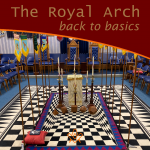 The Royal Arch - Back to Basics In the Royal Arch ceremony, the sojourners are buried with their tools in a vault. The sun, at its highest, provides enlightenment and the principal sojourner is returned to the former companions of his toil |
 The Holy Land and the Holy Sites P4 Fourth instalment of the four-part series, considers ‘masonic’ aspiration and activity regarding the Holy Land and The Holy Sites |
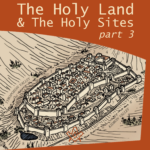 The Holy Land and The Holy Sites P3 Third instalment of the four-part series, considers ‘masonic’ aspiration and activity regarding the Holy Land and The Holy Sites |
 The Holy Land and The Holy Sites P2 The four-part series will consider ‘masonic’ aspiration and activity regarding the Holy Land and The Holy Sites |
 The Holy Land and The Holy Sites P1 In this four-part series, we will consider ‘masonic’ aspiration and activity regarding the Holy Land and The Holy Sites |
 Science and Citizenship: Towards a 21st Century Masonic Mindset. |
 Towards a 21st Century Masonic Mindset: Part 3 ‘Freemasonries’ and the Fourth Industrial Revolution |
 Towards a 21st Century Masonic Mindset: Part 2: ‘Freemasonries’ and Religiosity. |
 Towards a 21st Century Masonic Mindset: Part 1: ‘Freemasonries’ and Governance. |
masonic knowledge
to be a better citizen of the world
share the square with two brothers

click image to open email app on mobile device








